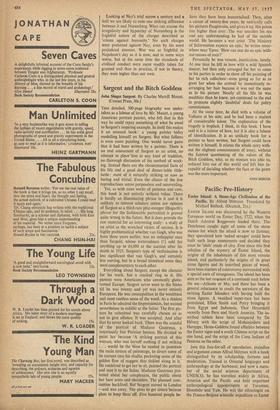Sargent and the Bitch Goddess
John Singer Sargent. By Charles Merrill Mount. (Cresset Press, 30s.) THIS detailed, 300-page biography was under- taken as a labour of love by Mr. Mount, a young American portrait painter, who felt that in this way he could repay something of what he owed to Sargent's inspiring example. In itself this makes it an unusual book : a young painter today modelling himself on Sargent. But what follows is even more puzzling. One would never guess that it had been written by a painter. There is no real assessment of Sargent as an artist, no attempt to place him in any kind of tradition, no thorough discussion of his method of work- ing. Instead there are the circumstantial facts of his life and a good deal of dinner-table tittle- tattle : most of it naturally striking us now as boring and trivial. Even the choice of the few reproductions seems purposeless and unrevealing.
Yet, as with most works of patience and care, this book is not entirely without value. There is hardly an illuminating phrase in it and it is unlikely to interest scholars unless our opinion of Sargent as a third-rate phiz-monger (Hogarth's phrase for the fashionable portraitist) is proved quite wrong in the future. But it does provide the raw material for an interesting study : a study of an artist as the wretched victim of success. It is highly problematical whether van Gogh, who was born three years earlier, was an unhappier man than Sargent, whose watercolours (!) sold for anything up to £4,800 at the auction after his death in 1925. Sargent's type of victimisation is less significant that van Gogh's, and certainly less moving, but in a broad historical sense they were complementary to each other.
Everything about Sargent, except the clamour for his work, has a cracked• ring to it. His parents were Americans who constantly globe- trotted Europe. Sargent never went to the States till he was twenty and yet was never entirely European. He was cosmopolitan in the wealthiest and most rootless sense of the word. As a student in Paris he admired the Impressionists, but wanted nevertheless to exhibit at the Salon. The first pic- ture he submitted was carefully chosen so as not to give offence. It was accepted. And after that he never looked back. There was the scandal of the portrait of Madame Gautreau, a notoriously fast Parisian hostess. He decided to paint her because 'A striking portrait of this woman, who was herself nothing if not striking . . . would be the blow he needed to penetrate the main stream of patronage, to divert some of its current into his studio, pocketing some of the golden flow of nuggets that tinkled along in it.' He contrived to get her to sit, painted the portrait
and sent it to the Salon. Madame Gautreau pro- tested about her complexion, the public about her bare arms and shoulders. The planned com- motion backfired. But Sargent moved to London —and was away. The plots to get sitters became plots to keep them Off. Five hundred people be-
lieve they have been immortalised. Then, after a career of twenty-five years, he satirically calls his pictures Paughtraits, and gives it up. His prices rise higher than ever. The war smashes his era and any understanding he had of the outside world. He becomes a war artist. 'The Ministry of Information expects an epic,' he writes some- where near Ypres. 'How can one do an epic with- out masses of men?'
Personally he was remote, inarticulate, lonely. At one time he fell in love with a wild Spanish dancer, but then only arranged for her to come to his parties in order to show off his painting of her to rich collectors—even going so far as to greet her when she arrived by immediately re- arranging her hair because it was not the same as in his picture. Nearly all his life he was wealthier than he knew, yet continued to the end to promote slightly 'doubtful' deals for paltry commissions.
At the same time, he died with a volume of Voltaire at his side; and he had been a student of considerable talent. The explanation of the tragedy is implicit, I think, in this book. I have said it is a labour of love, but it is also a labour of identification. It is an unlikely book for a painter to have written, but Sargent could have written it himself. It relates the whole story with- out the slightest consciousness of irony, without the faintest questioning of the values of the Bitch Goddess, who, as no woman was able to, seduced him out of this world and left him in- capable of deciding whether the face or the gown was the more important.
JOHN BERGER


































 Previous page
Previous page